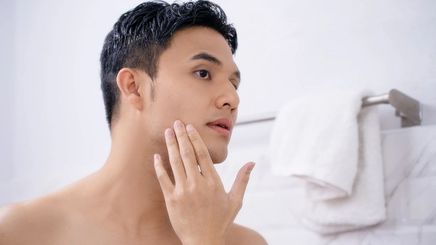
Pimples have left you scarred enough as a teenager. So, when jawline acne keeps happening at the most inopportune times, it can be a source of frustration and self-consciousness. How do you handle a problem you thought you tamed back in puberty?
Hormones are still likely to be blamed for adult-onset zits. But many factors in your lifestyle, from diet to hygiene, can also contribute. Understanding the causes can help you find the best ways to tackle cheek, forehead, scalp, and chin acne.
Causes of Adult Acne
Acne occurs when hair follicles beneath the skin become clogged with sebum, the skin's natural oil, and dead skin cells. Your chances of developing adult acne increase each time there's sebum overproduction or bacteria buildup. But what causes them to happen? Here are possible factors.
Hormones
An increase in androgens, a group of male sex hormones, can stimulate sebum production. The excess oil can clog pores and cause inflammation and infection, leading to acne. A Clinical, Cosmetic and Investigational Dermatology review reports that hormonal fluctuation often develops into jawline acne.
Diet
A diet high in sugar and fat may lead to zits, based on a study published in JAMA Dermatology (about 6,215 men participated although women were the majority). Researchers found a correlation between the chances of having acne and the consumption of the following:
- Fatty and sugary products
- Sugary beverages
- Milk
Personal hygiene
Daily showers remove excess sebum, dirt, and bacteria from the skin. But how often are you washing your pillowcases and bath towels? Remember, your bedding accumulates oil, dead skin cells, and grime that can cause facial acne. The common expert advice is to launder pillowcases every two weeks and change towels every three days.
Genetics
Yes, you may have inherited your acne problem from your parents. Your genetic makeup determines how your skin reacts to stimuli like bacteria, stress, or environmental factors. For example, you may have more sensitive skin than others. As a result, exposure to specific triggers increases the risk of developing breakouts.
Stress
Emotional stress does not cause acne, but research suggests it can trigger or worsen pimples. Elevated stress hormones like cortisol can stimulate the sebaceous glands to produce more oil. And, as you know, acne-causing bacteria love excess sebum production.
Moreover, stress can disrupt the balance of other hormones, such as androgens. It can also affect your immune system, weakening your ability to combat bacteria and inflammation.
Self-Care Tips When You're Prone to Jawline Acne
When you have pimples on the jawline, you must be diligent with your skincare routine, incorporating the right products and techniques. Lifestyle changes can also make an enormous difference in preventing breakouts, especially when the cause is hormonal-related. You can use these self-care tips to manage jawline acne.
1. Use a cleanser suited to your skin type.
Dermatologists recommend washing your face twice daily and using a cleanser made for your skin type. Acne-prone but oily complexion may benefit from cleansers infused with charcoal because it can "suck" the bacteria, dirt, and oil from the skin.
You can start with Master All-Day Active Clay Wash Acne Fight, which has charcoal that can control oil and absorb impurities from the skin. It also has salicylic acid that helps shed dead cells.
For dry skin, though, try POND'S Men Facial Wash Acne Solution, which contains ingredients like niacinamide and salicylic acid, well-known exfoliants that fight acne. The product's unique formulation also promises acne relief in three days.
2. Apply a gentle moisturizer.
After cleansing, hydrate and protect your skin with water-based, non-greasy and non-comedogenic (won't clog pores) moisturizer. Look for ingredients that soothe inflammation, such as aloe vera or green tea. The American Academy of Dermatology (AAD) advises applying moisturizer to your face immediately after bathing, showering, or shaving while the skin is still damp.
3. Check your razor and shaving technique.
AAD recommends using a single- or double-blade razor to avoid razor bumps, burns, or ingrown hairs. First, wet your skin and hair. Then apply moisturizing shaving cream, shaving in the direction the hair grows. Change your blade after five to seven shaves to minimize irritation.
4. Avoid touching or picking at chin acne.
To avoid blemishes and scars, any dermatologist will tell you to stop picking at pimples on your jawline or any part of your body. You can also spread infection when you touch or pop your acne, potentially causing breakouts to other parts of your face.
5. Eat well and hydrate.
As research suggests, sugar and fat can trigger acne or cause inflammation. Instead, choose , picking non-starchy vegetables and fruits. Fill your meals with whole grains, lean proteins, and healthy fats. Drinking plenty of water flushes out toxins and hydrates your skin.
6. Exercise regularly
Exercise improves blood circulation and oxygen delivery to the skin cells. It can also help regulate insulin levels, preventing an increase in androgens, the hormones that can trigger the oil glands to overproduce sebum. An active lifestyle can also boost mood, helping to .
7. Manage your stress
Instead of yoga or meditation, you may prefer nature walks or hitting the pool. Stress relief can also be something other than physical activity. You can also read a book, listen to music, or get a massage to soothe your nerves.
Invest in Good Skincare
Clear and healthy skin enhances your physical appearance and plays a crucial role in . You deserve to look and feel your best, both personally and professionally.
A targeted skincare routine and healthy lifestyle habits can help you achieve the clear complexion you want. But consult a dermatologist if your jawline acne is persistent, severe, or not responding to over-the-counter treatments. You may need prescription medication or other procedures to treat your condition.